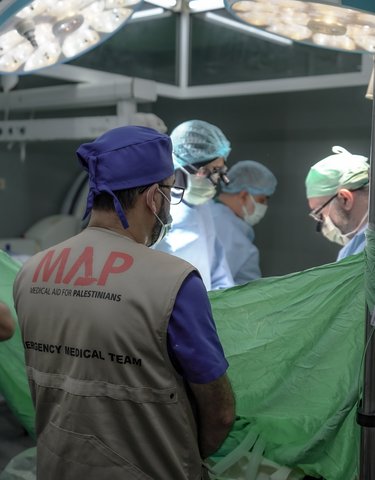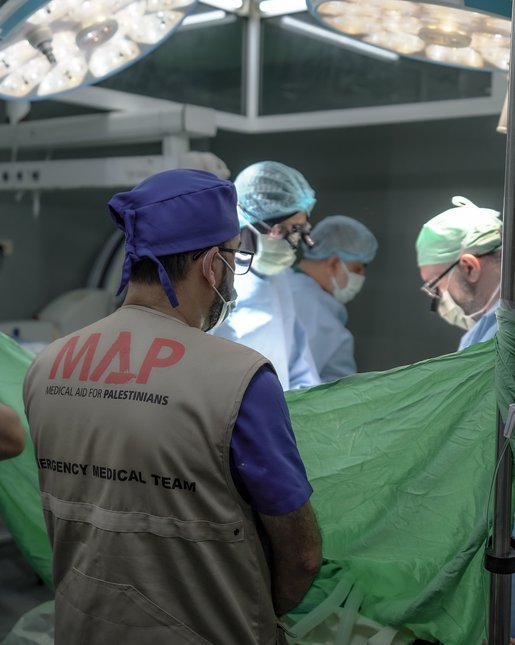Our essential food support to vulnerable Palestinian refugees in Lebanon this Ramadan
4 May 2021
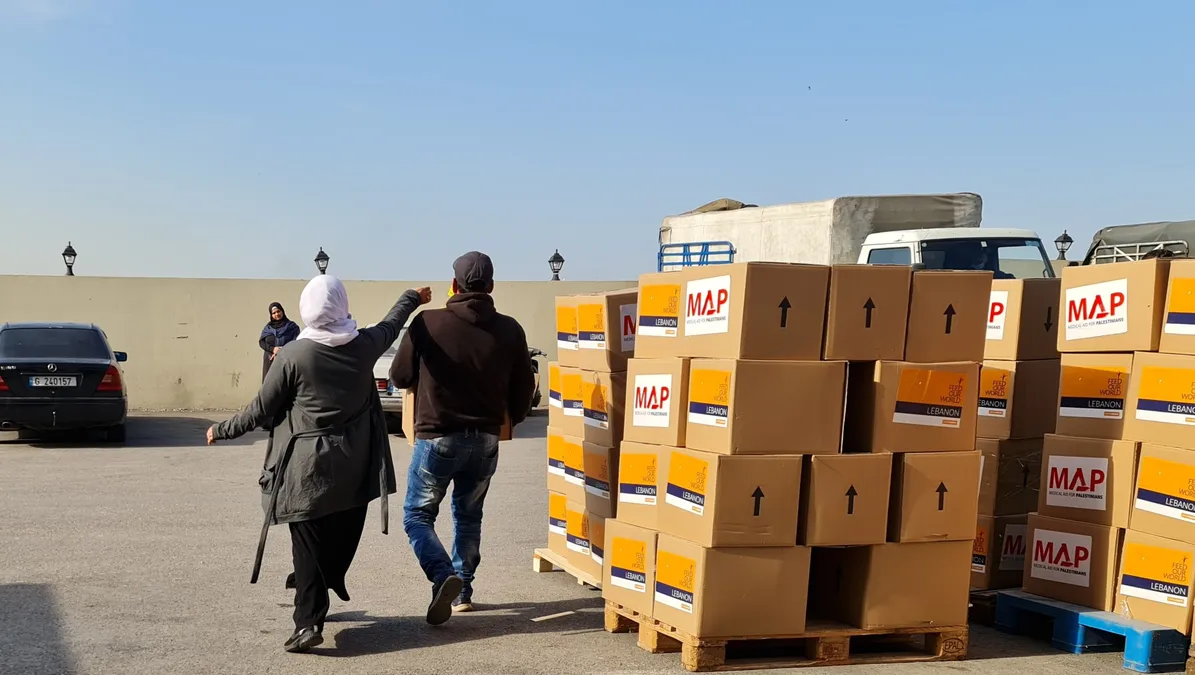
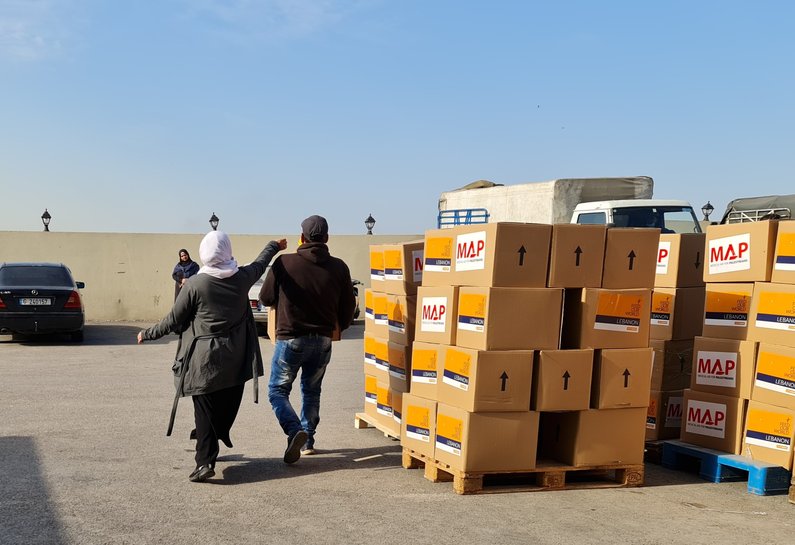
Even before the pandemic, 62% of Palestinian refugee families were food insecure. Medical Aid for Palestinians (MAP)’s team of community midwives, who provide regular home visits, check-ups and health advice for vulnerable new mothers, babies and pregnant women in the refugee camps, have seen how these new crises are putting a growing number of women and children at risk of malnutrition.
During the month of Ramadan, MAP has partnered with Penny Appeal to provide food parcels to 725 families visited regularly by MAP’s community midwives, living in and around the Ein el Helweh and Mieh Mieh refugee camps in southern Lebanon. These parcels contained different types of pulses, rice, wheat, dates, cooking oil, dry milk, sugar, salt, and tea.
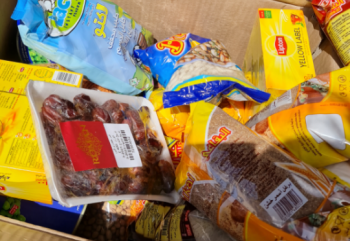
MAP’s Senior Programme Officer in Lebanon, Wafa Dakwar, spoke to Inas*, one of the women who received a food parcel, to hear about how this support is helping her family get through this Ramadan.
Hi Inas, can you tell me more about yourself?
“I am a Palestinian refugee living in Ein el Helweh camp. I am a mother of four children; the youngest of my children is a three-month-old baby boy. I do not work and neither does my husband. My husband used to work in temporary jobs, but with the economic crisis Lebanon, he and many others are no longer able to find any work. My husband’s health has deteriorated considerably recently, and now he is unwell most days. Nonetheless, we are a happy family despite our difficult conditions and our daily struggles.”
How are you coping with the economic crisis and with your family not having a stable income?
“We were badly affected by the economic crisis. My husband was unable to find work while prices soared. This is a major problem as I need to buy food, diapers, and other essential items for my children, along with medicine for my husband. I sought the support of UNRWA’s relief program, but my attempt was unsuccessful. Luckily, one charity has been giving us a small amount of monthly cash assistance which is helping us to survive.
"We are no longer able to afford four meals per day, so we started having only two instead. My husband and I always prioritise our children; if we have two loaves of bread, we give both to the children to eat, and if there are any leftovers, my husband and I will have those. I do not mind being hungry, but I do not want my children to suffer or for their health to be affected. I do not cook on daily basis anymore. I cook once every three days as food items have become very expensive and cooking oil is not affordable.”
How has COVID-19 impacted your family?
“Lebanon’s economy collapsed completely with COVID-19. The whole country was affected on many levels. For my family, we no longer visit one another or go out, which obviously impacts our psychological wellbeing and makes us tense. Studying became a problem for my children; we don’t have a computer to use for online learning. We have a single phone that three of my children use for studying. This arrangement wasn’t working, so I registered two of my children for in-person tutoring sessions which cost 180,000 Lebanese Pounds (£85 GBP) per month. Securing this amount of money is putting us under huge pressure, but education is a priority too. I feel that no one is taking these additional expenses in consideration when they decide to shift education online.”
Were Palestinian refugees affected more than others by these crises?
“The conditions of Palestinian refugees are the worst by far. Our conditions were quite bad even before the economic crisis. We do not have rights, and we do not benefit from any assistance from the government as in other countries that host Palestinian refugees.”
Did the crises affect your access to healthcare?
“Yes, for example, when we go to a hospital for any problem, they won’t receive us without a negative PCR [COVID-19] test, which costs 75,000 to 180,000 Lebanese Pounds [£35 to £85 GBP]. We don’t have this money, so we decide not to go the hospital even for essential matters.”
Can you tell us how MAP’s support has impacted you?
“The project is helping a lot. The midwife, Ola, visits me and does a check-up on my health and the health of my newborn. She helps me relax and feel reassured regardless of how stressed I am. She gives me advice on how to take care of my health, avoid stress, and eat nutritious and affordable foods. She is very kind; I feel she is like a sister and not just a healthcare provider.
“The food parcel came just when we needed it the most. My husband and I were very concerned and wondering how we would be able to get through Ramadan. When you fast all day, you need to have enough food for Iftar. The parcel was generous; it can last for the whole month and the items included are nutritious and of excellent quality. With this assistance, I can cook every day for my family. I make soup, a main dish, and dessert for Iftar. I am glad that my children are eating a variety of nutritious foods this Ramadan. We are very grateful for this assistance.
"The distribution of parcels was very organised. I did not have to wait, and the place was not crowded. The ladies handing the boxes were very nice and polite. I was very comfortable and felt respected while receiving the parcel. Many thanks go to Penny Appeal and MAP for making this assistance possible.”
Thank you Inas for speaking to us today.
You can support MAP’s essential maternal and child health services in Lebanon by making a donation today:
*Name changed to protect identity
